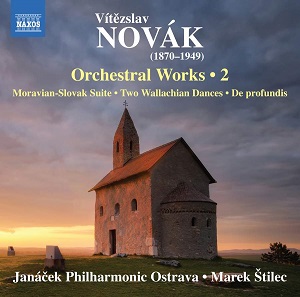
Vítĕzslav Novák (1870-1949)
Orchestral Works – Volume 2
Moravian-Slovak Suite (1903)
Two Wallachian Dances (1904-06)
De Profundis (1941)
Pavel Svoboda (organ)
Janáček Philharmonic Orchestra/Marek Štilec
rec. 2021, Ostrava, Czechia
Naxos 8.574369 [62]
I wonder if they ever knew or designed it so, but in the 1960s, Supraphon issued with minimal fanfaring some devastatingly successful LPs. These ‘lit my fire’ and must have ignited the missions and enthusiasms of others as well. It helped that these LPs were often sold in the UK at prices that under-swept the likes of Decca and EMI. There are many examples but for this listener I think, without too much effort, of Ančerl in Stravinsky’s Oedipus Rex, Turnovsky in an enduringly sensational Martinů Fourth Symphony, Aloys Klima conducting Suk’s War Triptych (SUAST50476), Talich in Suk’s towering Asrael (which I heard repeatedly on an antediluvian reel-to-reel machine) and Karel Šejna in Novák’s In the Tatras and About The Eternal Longing. The Šejna vinyl was picked up for less than one pound second-hand in a little shop in Westbury-on-Trym and was just sensational. It might well have been mono but that made no odds to me.
In modern times Novák’s torch has been borne aloft by later Supraphons, a clutch from the late-lamented ClassicO and Douglas Bostock, by Chandos, Virgin and Pešek in Liverpool and also by Naxos which brings us to this disc. It’s the third of a sequence which began with the indefatigably questing spirit of JoAnn Falletta in Buffalo (8.573683 overlapping the present disc) and has been driven onwards by Marek Štilec with two Czech or Slovak orchestras (8.574226). One must hope that Štilec and Naxos will now turn to two substantial Novák works that have been given the cold shoulder on account of misplaced political attitudes, I suspect: the Autumn Symphony and the May Symphony both from the late 1940s.
To the task in hand. First the Moravian-Slovak suite. At church evidences that this disc has been startlingly well recorded. There’s a subtle front-to-back reach about what we hear and a sweet depth. Ecclesiastical concentration is communicated without stodginess. Among the children predicts similar (perhaps more liberally aerated) invention in Prokofiev’s Winter Bonfires – also recorded by Supraphon (SUAST50773). There is delicious woodwind playing and smoothly honeyed strings as in the first movement. The Lovers is suitably dewy-eyed and uncloyingly amorous; a nice coupling for Sibelius’ Rakastava. The Ball – a natural progression one would think – is no village dance but a grand affair for the aristocracy. Novák ends with valiant defiance in a movement called At Night. Rather than the conventional uproar, this ends the half-hour suite with an almost Delian placid poetry. This looks lovingly to the mountain fastnesses of the Tatrai and starts rockingly like Saint-Saëns’ Havanaise.
Novák works I have not heard before are the Two Wallachian Dances (a title recalling Janáček’s Lachian Dances once recorded by François Huybrechts for Decca). The purposeful brilliance of Trojak which has some of the high spirits of Fibich’s A Night at Karlstein (superb Supraphon mono of this conducted by Václav Smetáček: SUC10020). Then the Dymak which is marked con fuoco. This is another jovial piece though it takes a while, in this performance, to prove itself as a con fuoco. It has a showy Rimsky-Korsakov aspect that is most engaging.
Štilec ends the disc with the most earnest and substantial work here. De Profundis is from 1941 and is Novák’s last tone poem. It was written in brooding protest at the Nazi occupation of Czechoslovakia (1939-45). This 22-minute work opens in sepulchral threatening gloom – a little like the darkness that opens Balakirev’s Tamara. A triumphant defiance often carried by the brass, especially the French horns, rises to prominence. The title is a reference to Psalm 130 – which also inspired US composer Vittorio Giannini. The arch of this work reaches its “crock of gold” with a section marked Sursum corda (viz Elgar and Korngold). All in all, it’s a pretty unremitting, concentrated piece with typically dark energy and lightning blazing in adversity. There’s embittered triumph at 11:52. The opalescent innocence of the organ part, played by Pavel Svoboda, can be heard at 16:20 but the organ rises to valiant magnificence towards the end which superbly carries off the whole. This is a great modern recording to place alongside the now vintage Šejna version.
This is an excellent disc the virtues of which are further shored up by English-only notes by Naxos regular, Richard Whitehouse.
Rob Barnett
Help us financially by purchasing from





















